Ode to a Nightingale1 |
|
My heart achesWhile it is not stated, the speaker is addressing the whole poem to a nightingale.
 A common nightingale., and a drowsy numbness pains
A common nightingale., and a drowsy numbness pains
My sense, as though of hemlockA poison made from an herb or a poisonous drink made from that herb.
 The blooms of hemlock are very poisonous. I had drunkThe speaker feels as if he has drunken poison.,2
The blooms of hemlock are very poisonous. I had drunkThe speaker feels as if he has drunken poison.,2
Or emptied some dull opiateThe speaker tries to explain a different way. He feels drugged and that is how he has entered the odd world of night.
 Opium poppy plants. to the drains
Opium poppy plants. to the drains
One minute past, and Lethe-wardsA river in Hades (the underworld). Souls about to be reincarnated drank from it to forget their past lives. had sunk:
'Tis not through envy of thy happy lotHere the speaker addresses the nightingale directly.
 The silhouette of a nightingale.,
The silhouette of a nightingale.,
But being too happy in thine happinessIn the line before, the speaker says he is not envious of the bird's happiness. This line states that he is just happy to see the bird happy.,—
That thou, light-wingedThe bird is small so it is light on its wings. When read aloud, this phrase should be read using three syllables: light-wing-ed. DryadA wood nymph or nymph of the trees. Dryads or nymphs were female personifications of natural features, like mountains and rivers; they were young, beautiful, long-lived, and liked music and dance. A Dryad was connected to a specific tree and died when the tree died.
 "The Dryad" by Evelyn De Morgan, 1885. of the treesThe nightengale is the tree nymph.
"The Dryad" by Evelyn De Morgan, 1885. of the treesThe nightengale is the tree nymph.
In some melodious plot
Of beechen greenThe greenness of beech trees.
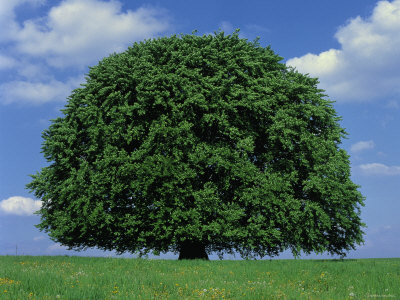 A beech tree., and shadows numberless,
A beech tree., and shadows numberless,
Singest of summerThe nightengale sings about summer. in full-throatedThe bird does not hold back and sings loudly. ease.
O, for a draughtA draft oserved from a cask
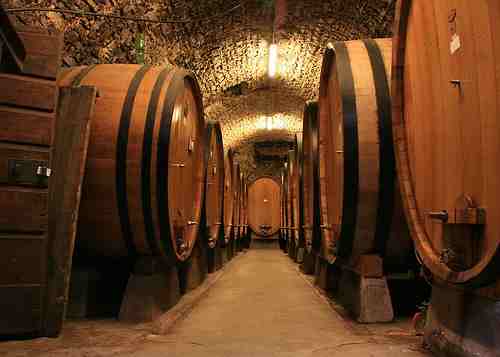 Large wine casks, where wine matures. of vintage!This is wine made only of grapes from the same harvest. that hath been
Large wine casks, where wine matures. of vintage!This is wine made only of grapes from the same harvest. that hath been
Cool'd a long age in the deep-delved earthThe speaker wants wine that has been chilled by being stored in the ground, where it is cool.,
TastingThe speaker wants the wine to taste like flowers, green hillsides, dancing, music, and happiness. of FloraGoddess of flowers and fertility.
 "Flora, Roman Goddess of Flowers" by Eveleyn De Morgan, 1894. and the country green,
"Flora, Roman Goddess of Flowers" by Eveleyn De Morgan, 1894. and the country green,
Dance, and ProvençalOf Provence, an area in the south of France associated with song, pleasure, and luxury. song, and sunburnt mirth!
O for a beaker full of the warm SouthFrom Provençal in the south of France.,
Full of the true, the blushful HippocreneA spring sacred to the Muses, located on Mt. Helicon. Drinking its waters inspired poets. The eight muses were associated with different arts, such as epic poetry, sacred song, and dancing).,
With beaded bubblesThe small bubbles that occur when pouring. they "wink" as they pop.
 Bubbles in a wine glass. winking at the brim,
Bubbles in a wine glass. winking at the brim,
And purple-stained mouthA rich red wine will stain the skin.;
That I might drink, and leave the world unseen,
And with thee fade away into the forest dimThe speaker wants to join the happy nightingale in the forest.:
Fade far away, dissolve, and quite forgetHe is imaginging what it would be like to leave this world.
What thou among the leaves hast never knownThe next lines are describing the human world, which has never bothered the nightingale.,
The weariness, the fever, and the fret
Here, where men sit and hear each other groanOur world is a world of older and sick figures, awaiting death.;
Where palsy shakes a few, sad, last gray hairs,
Where youth grows pale,3
and spectre-thin, and dies;
Where but to think is to be full of sorrow
And leaden-eyed despairs,
Where Beauty cannot keep her lustrous eyes,
Or new Love pine at them beyond to-morrow.
Away! away!The repetition of the word grabs the reader's attention. for I will fly to theeThe nightingale and its peaceful world.,
Not charioted by BacchusThe Roman god of wine and mischief.
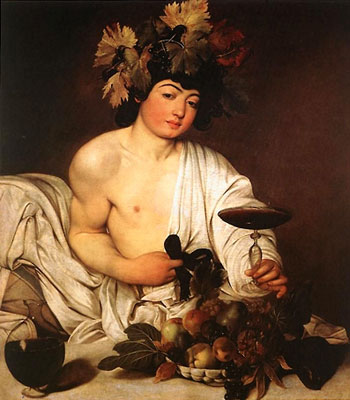 "Bacchus" by Michelangelo Merisi da Caravaggio, 1595. and his pardsLeopards, which drew Bacchus's chariot.
"Bacchus" by Michelangelo Merisi da Caravaggio, 1595. and his pardsLeopards, which drew Bacchus's chariot.
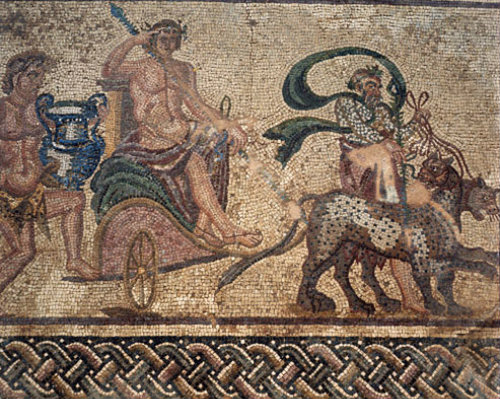 A mosaic of Bacchus' chariot being pulled by leopards.,
A mosaic of Bacchus' chariot being pulled by leopards.,
But on the viewless wings of Poesy Poetry in general or, depending n how you read this ode, a specific kind of poetry: visionary poetry or fantasy.,
Though the dull brain perplexes and retards:
Already with thee! tender is the night,4
And haplyPerhaps, by chance. the Queen-MoonThe moon. Calling it the Queen-Moon adds to the natural beauty in this poem. is on her throne,
Cluster'd around by all her starry FaysFairies. These cluster'd faires are the stars surrounding the moon.;
But here there is no light,
Save what from heaven is with the breezes blown
Through verdurous gloomsThe darkness from plants and trees blocking the moonlight. It creates an ominous glow.
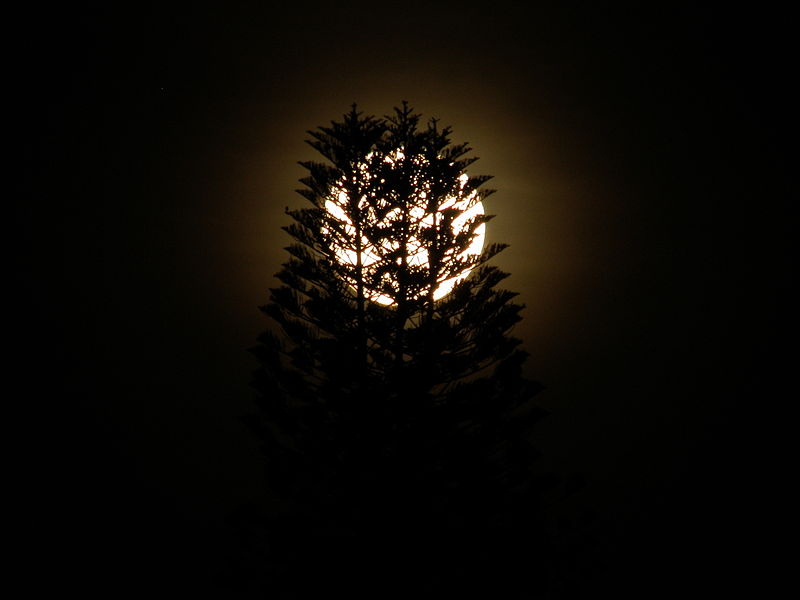 The moon blocked by trees on a hazy evening. and winding mossy ways.
The moon blocked by trees on a hazy evening. and winding mossy ways.
I cannot seeIt is too dark to see. what flowers are at my feet,
Nor what soft incenseSomething smells nice on the trees but he cannot see it. hangs upon the boughs,
But, in embalmedThe darkness and scents are enveloping him as he experiences the following things. darkness,5
guess each sweet
Wherewith the seasonable month endows
The grass, the thicketA dense section of bushes or trees.
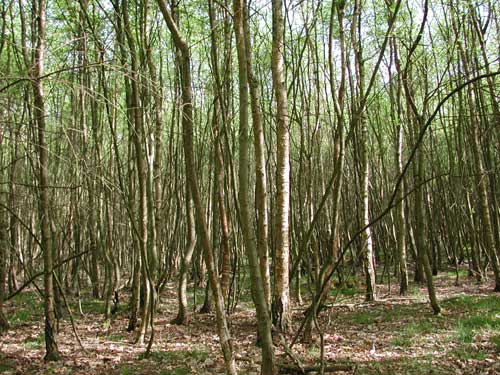 A thicket of trees in the woods., and the fruit-tree wild;
A thicket of trees in the woods., and the fruit-tree wild;
White hawthornSmall white blooms on a bush.
 caption, and the pastoral eglantineA small pink and white flower bush.
caption, and the pastoral eglantineA small pink and white flower bush.
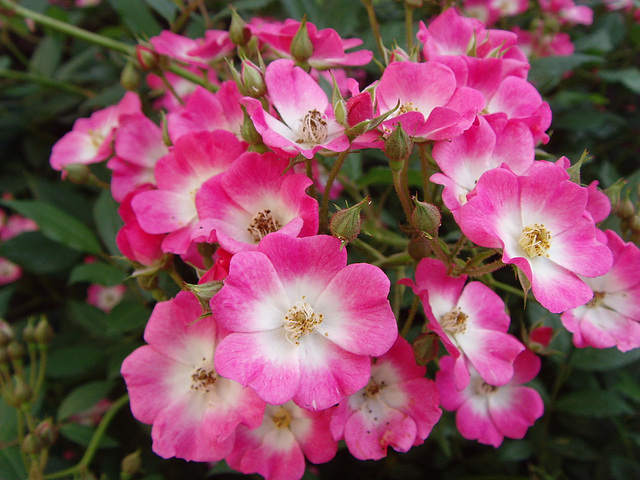 Eglantine blooms.;
Eglantine blooms.;
Fast fading violetsSmall purple flowers.
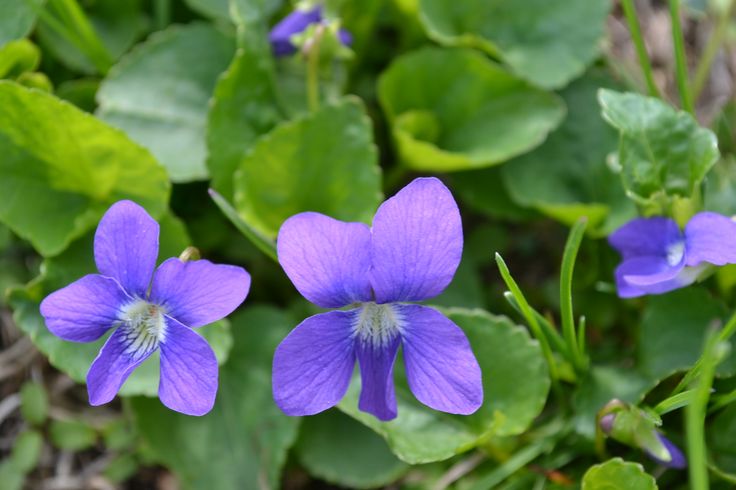 Violets in teh wild. cover'd up in leaves;
Violets in teh wild. cover'd up in leaves;
And mid-May's eldest child,
The coming musk-roseA small white flower that is known for giving off a musky scent.
 The musk rose., full of dewy wine,
The musk rose., full of dewy wine,
The murmurous haunt of flies on summer eves.
DarklingSomething that relates to growing darkness. In this case, it is the nightingale. I listen; and, for many a time
I have been half in love with easeful DeathThe speaker feels death is a way to stay in the dark but lovely world.,
Call'd him6
soft names in many a mused rhyme,
To take into the air my quiet breath;
Now more than ever seems it rich to die,
To cease upon the midnight with no pain,
While thou art pouring forth thy soulHe wishes to die while hearing the bird sing. abroad
In such an ecstasy!
Still wouldst thou sing, and I have ears in vain—
To thy high requiemLiterally, a song or musical service for the repose of the dead. In this case, the speaker is calling the nightengale's song a requiem. become a sod.While the nightingale continues singing, the dead speaker would become part of the earth.
Thou wast not born for death, immortal Bird!He states the nightingale cannot die.
No hungry generations tread thee downThe bird is not hunted by the next generation of nightingales.;
The voice I hear this passing night was heard
In ancient daysThe voice of the nightingale is immortal. by emperor and clown:
Perhaps the self-same songIt could be the same nightingale call hear by emperors, servants, and even Ruth of the Bible that found a path
Through the sad heart of RuthIn the Bible, Boaz saw Ruth, the Moabite, working in the fields, fell in love with her and married her; David is one of her descendents. A book in the Bible is named after her. She is frequently alluded to by poets for her devotion to her mother-in-law Naomi or as a stranger in a strange land. In a sense she has achieved immortality.
 A painting of Ruth.,7
when, sick for home,
A painting of Ruth.,7
when, sick for home,
She stood in tears amid the alien cornGrain, often wheat, in British usage. The corn or wheat is alien to Ruth because it is not the kind of her homeland.;
The same that oft-times hathThe speaker transfers fromt he nightingale's world to an imaginary place.
Charm'd magic casementsA window that opens on a hinge.
 How a casement opens., opening on the foamA window on a ship is opened.
How a casement opens., opening on the foamA window on a ship is opened.
Of perilous seas, in faery lands forlorn.The nightingale sets off alone.
Forlorn!The speaker realises he is alone. the very word is likeA simile. a bell
To toll me backThe speaker is mentally woken up from imagining the nightingale's world and journey. from thee to my sole self!
Adieu! the fancyImagination. It cannot keep him in the imagined world like he wants. cannot cheat so well
As she is fam'd to do, deceiving elf.
Adieu! adieu!More repetition. thy plaintive anthem fadesThe nightingale and its song fades as it flies away.
Past the near meadows, over the still stream,
Up the hill-side; and now 'tis buried deep
In the next valley-gladesThe bird is out of sight.:
Was it a vision, or a waking dream?
Fled is that music:—Do I wake or sleep?In the closing line, the speaker questions if he ever was asleep or is even really awake now. He's in a dreamlike state, suspended between.
Notes
1. Critics generally agree that Nightingale was the second of the five "great odes" of 1819. It is considered the "twin ode" to "Ode on a Grecian Urn."
Twenty years after the Keats' passed away, friend and artist Joseph Severn painted the famous portrait "Keats Listening to a Nightingale on Hampstead Heath""Keats Listening to a Nightingale on Hampstead Heath"
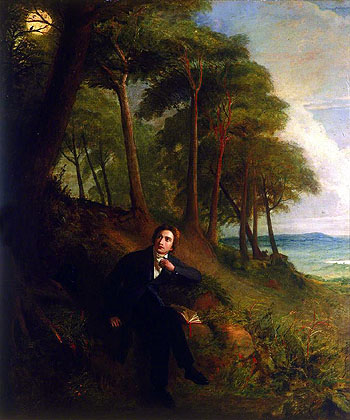 by Joseph Severn, 1845. in 1845.
by Joseph Severn, 1845. in 1845.
Keats's friend and roommate, Charles Brown, described the composition of this beautiful work as follows:
In the spring of 1819 a nightingale had built her nest near my house. Keats felt a tranquil and continual joy in her song; and one morning he took his chair from the breakfast-table to the grass plot under a plum-tree, where he sat for two or three hours. When he came into the house, I perceived he had some scraps of paper in his hand, and these he was quietly thrusting behind the books. On inquiry, I found these scraps, four or five in number, contained his poetic feeling on the song of our nightingale. The writing was not well legible; and it was difficult to arrange the stanzas on so many scraps. With his assistance I succeeded, and this was his "Ode to a Nightingale," a poem which has been the delight of everyone.
However, Charles Wentworth Dilke, who co-owned Wentworth Place and visited often, discredited Brown's memory by saying it was "pure delusion." After reading the Brown's account in Milnes's 1848 biography of Keats, Dilke noted in the margin of his copy, "We do not usually thrust waste paper behind books."
Some critics offer Brown some credit and believe he confused the ode title. It was much more likely "Ode on Indolence" because its original manuscript is lost and the order of its stanzas has been debated (Wolfson 250).
On the original manuscript, Keats titled the poem "Ode to the Nightingale." Later, his editors changed it to "Ode to a Nightingale."
2. In stanzas one and two, the speaker focuses on teh release provided by poison, drugs, or drink. The described thoughts ring with dark images as the speaker attempts to escape reality. However, in stanza four the speaker instead chooses Poesy, or poetry, as his method of escape. This speaks to keats' creative process and honest love for poetry.
3. The "last gray hairs,/ Where youth grows pale" is Keats commentary about fleeting time. Time was a reoccuring theme in Keats' work, most notably in "Ode on a Grecian Urn."
4. "Tender is the Night" is the title of a work by F. Scott Fitzgerald.
5. Starting with the "embalmed darkness" and continuing until the end of the stanza, Keats beautifully describes a scene the speaker cannot see. The speaker must therefore rely of the scent of the parts of nature described. The "soft incense," "fruit-tree," and "musk-rose" are examples. Others require hearing, as with moths and flies.
6. The speaker becomes very comfortable with death, saying he is "half in love" and has written about Death often. the speaker personifies Death as "he." The speaker see death as a painless way to remain in his happy state. As made evident by the timeline and almost every account of Keats' life, he was surrounded by death at a very young age. He had seen family die when he was a boy and then dealt with the dead at Guy's Hospital during his training.
7. It is interesting that Keats references Ruth from the Bible when he uses several other odes to combat Milton's opinion that the nativity story is better. Keats' preference for the classical myths could be due to his romantic nature. When Tom was ill and Joseph Severn tried to comfort Keats, he snapped out, "I think a malignant being must have power over us – over whom the Almighty has little or no influence – yet you know Severn I cannot believe in your book – the Bible. …Here am I, with desperation in death that would disgrace the commonest fellow."